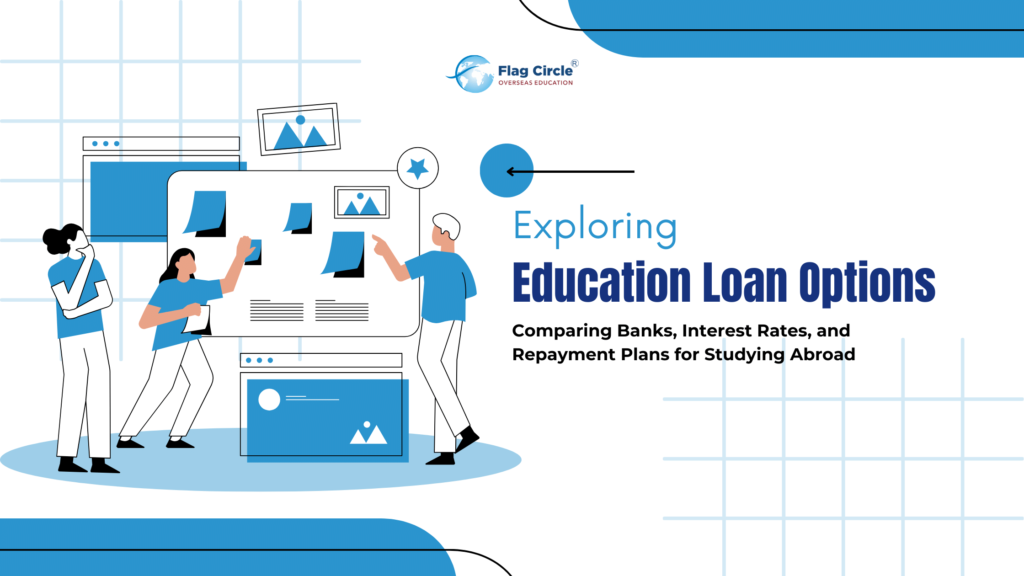Understanding Education Loans for Studying Abroad:
Embarking on a journey to study abroad is an exhilarating prospect, filled with opportunities for personal and academic growth. However, the financial aspect of pursuing education overseas can often be daunting. This is where education loans come into play, serving as a crucial lifeline for aspiring students who dream of studying at prestigious institutions across the globe.
Education loans are financial tools designed to provide funding for tuition fees, living expenses, travel costs, and other associated expenditures incurred while pursuing higher education abroad. These loans offer students the flexibility to focus on their studies without being burdened by immediate financial constraints.
The significance of education loans for studying abroad cannot be overstated. They enable students to access world-class education and pursue academic opportunities that may not be available in their home country. By obtaining an education loan, students can unlock doors to prestigious universities, gain exposure to diverse cultures, and broaden their horizons.
However, choosing the right bank and loan option is paramount to ensuring a smooth and hassle-free study abroad experience. Each bank offers different loan schemes with varying interest rates, repayment terms, and eligibility criteria. It’s essential to carefully evaluate these factors and select the option that best suits your individual needs and circumstances.
When choosing an education loan provider, consider factors such as:
- Interest Rates:
Compare the interest rates offered by different banks and choose a loan with the most competitive rates. Lower interest rates can significantly reduce the overall cost of borrowing and make repayment more manageable in the long run.
- Repayment Plans:
Evaluate the repayment plans offered by banks, including the duration of the repayment period, flexibility in EMIs, and any moratorium periods available. Opt for a repayment plan that aligns with your financial capabilities and future goals.
- Loan Amount and Eligibility:
Determine the loan amount you require based on your tuition fees, living expenses, and other costs associated with studying abroad. Ensure that you meet the bank’s eligibility criteria regarding academic qualifications, admission status, and co-borrower requirements.
- Customer Service and Support:
Consider the reputation and credibility of the bank, as well as the quality of customer service provided. Opt for a bank that offers efficient loan processing, responsive customer support, and transparent communication throughout the loan application process.
Comparing Banks and NBFCs Offering Education Loans
Embarking on a journey to study abroad is an exciting endeavour, but it often comes with significant financial considerations. Education loans play a vital role in supporting students’ aspirations to pursue higher education overseas. When it comes to obtaining an education loan, students have a choice between traditional banks and Non-Banking Financial Companies (NBFCs).
Banks Offering Education Loans:
- Banks are traditional financial institutions that offer a wide range of banking services, including education loans.
- They are regulated by the Reserve Bank of India (RBI) and follow strict guidelines in providing financial products and services.
- Banks typically have a large network of branches and ATMs, making it convenient for customers to access their services.
- Some well-known banks offering education loans include the State Bank of India (SBI), HDFC Bank, ICICI Bank, Axis Bank, and Canara Bank.
NBFCs Offering Education Loans:
- NBFCs are financial institutions that provide banking services similar to banks but do not hold a banking license.
- They are regulated by the Reserve Bank of India (RBI) but operate under different regulations compared to banks.
- NBFCs may offer more flexible terms and conditions on their education loans compared to banks, catering to the specific needs of students.
- Some prominent NBFCs offering education loans include Avanse Financial Services, InCred, Auxillo, Finserve, and Credila.
Interest Rates and Fees:
- Banks and NBFCs may offer varying interest rates on education loans, with banks usually offering lower rates due to their lower cost of funds.
- NBFCs may charge higher interest rates to compensate for the higher risk associated with their lending activities.
- It’s essential to compare the interest rates, processing fees, and other charges offered by banks and NBFCs to choose the most cost-effective option.
Eligibility Criteria and Documentation:
- Both banks and NBFCs have specific eligibility criteria for education loans, including academic qualifications, admission status, and co-borrower requirements.
- They also require documentation such as academic records, admission letters, income proof, and collateral documents (if applicable).
- It’s essential to review the eligibility criteria and documentation requirements of banks and NBFCs to ensure you meet the necessary criteria.
Customer Service and Support:
- Banks typically have a larger customer base and may offer more extensive customer service support, including online banking, mobile apps, and dedicated helplines.
- NBFCs may provide personalised customer service and support, catering to the unique needs of individual borrowers.
- Consider factors such as responsiveness, transparency, and accessibility when evaluating the customer service and support offered by banks and NBFCs.
Both banks and NBFCs play a crucial role in providing education loans to students aspiring to study abroad. Each has its own set of advantages and considerations, and it’s essential to carefully evaluate and compare the offerings of banks and NBFCs to choose the option that best suits your needs and circumstances. By conducting thorough research and weighing the pros and cons, you can make an informed decision and secure the necessary funding for your study abroad journey.
Interest Rates and Loan Amount:
One of the critical factors to consider when applying for an education loan is the interest rate offered by the lending institution. Additionally, understanding how loan amounts are determined can help students make informed decisions about their financing options.
Comparing interest rates:
Different banks and financial institutions offer education loans with varying interest rates. It’s essential for students to compare these rates to ensure they secure the most favorable terms. Here’s a brief overview of interest rates offered by different banks:
- State Bank of India (SBI): SBI offers education loans with competitive interest rates, often lower than those offered by other banks. The interest rates may vary based on factors such as loan amount, tenure, and the creditworthiness of the borrower.
- HDFC Bank: HDFC Bank provides education loans at competitive interest rates, tailored to meet the financial needs of students pursuing higher education abroad. The interest rates are influenced by factors such as loan amount, tenure, and the borrower’s credit profile.
- Axis Bank: Axis Bank offers education loans with flexible interest rates, allowing borrowers to choose between fixed and floating rates based on their preferences. The interest rates may vary depending on market conditions and other factors.
- ICICI Bank: ICICI Bank provides education loans with competitive interest rates, catering to the diverse needs of students seeking financing for studying abroad. The interest rates are influenced by factors such as loan amount, tenure, and the borrower’s creditworthiness.
Factors Influencing Interest Rates:
Several factors influence the interest rates offered by banks for education loans. These include:
- Loan Amount: The loan amount requested by the borrower can impact the interest rate. Higher loan amounts may attract lower interest rates, while smaller loans may have higher rates.
- Loan Tenure: The duration of the loan repayment period, known as the tenure, can influence the interest rate. Longer tenures may have higher rates, while shorter tenures may offer lower rates.
- Creditworthiness: The creditworthiness of the borrower, including their credit score and financial history, plays a significant role in determining the interest rate. Borrowers with a higher credit score may qualify for lower rates.
- Market Conditions: Interest rates for education loans may also be influenced by prevailing market conditions, including changes in the economy, inflation rates, and central bank policies.
Importance of Comparing Interest Rates:
Comparing interest rates offered by different banks is crucial for students seeking education loans to study abroad. By comparing rates, students can:
- Save Money: Choosing a loan with a lower interest rate can result in significant savings over the loan’s tenure, reducing the overall cost of borrowing.
- Make Informed Decisions: Comparing interest rates allows students to make informed decisions about their financing options, selecting the most cost-effective option that suits their financial needs.
- Understand Loan Terms: By comparing rates, students can gain a better understanding of the terms and conditions of different loans, including repayment options and flexibility.
Understanding Repayment Plans and Tenure for Education Loans
Understanding repayment plans and tenure is essential for effectively managing your education loan obligations. By exploring the various repayment plans offered by banks, including moratorium periods, EMI options, and prepayment facilities, you can make an informed decision that aligns with your financial goals and aspirations. Remember to evaluate repayment tenure carefully, considering factors such as financial stability, career goals, interest costs, and flexibility.
Repayment plans offered by banks:
Banks typically offer multiple repayment plans to accommodate the diverse needs of students. These plans often include:
- Equated Monthly Installments (EMIs): Under this plan, borrowers repay the loan amount along with the interest in fixed monthly installments over the loan tenure.
- Moratorium Period: Banks may provide a moratorium period, during which borrowers are not required to make any repayments. This period usually extends until the completion of the course and may include an additional grace period post-course completion.
- Step-up or step-down EMIs: Some banks offer flexibility in EMI payments, allowing borrowers to start with lower EMIs initially and gradually increase them over time (step-up) or vice versa (step-down).
- Prepayment Facilities: Banks may offer prepayment facilities, allowing borrowers to repay a part or the entire loan amount before the end of the tenure without incurring any penalty.
Importance of Evaluating Repayment Tenure:
Repayment tenure refers to the duration over which borrowers are required to repay the education loan. It’s crucial to evaluate the repayment tenure and choose a plan that aligns with your future financial projections. Consider the following factors:
- Financial Stability: Assess your financial stability and income prospects post-graduation. Choose a repayment plan that allows you to comfortably manage EMIs without undue financial strain.
- Career Goals: Consider your career goals and potential earning capacity in your chosen field. Opt for a repayment tenure that allows you to pursue your career aspirations without feeling burdened by loan repayments.
- Interest Cost: Longer repayment tenures may result in higher overall interest costs, while shorter tenures may lead to higher EMIs. Strike a balance between minimizing interest costs and managing monthly repayments effectively.
- Flexibility: Choose a repayment plan that offers flexibility in EMI payments, prepayment options, and moratorium periods. This ensures that you can adapt to changes in your financial circumstances without facing undue hardship.
Eligibility Criteria and Documentation
Navigating the eligibility criteria and documentation requirements for education loans is a crucial step for students seeking financial assistance for their higher education aspirations. By understanding the common eligibility criteria and ensuring the proper submission of required documents, students can streamline the loan application process and move closer to realizing their academic dreams.
Eligibility Criteria for Education Loans:
Education loan eligibility criteria may vary slightly among different lenders, but some common requirements include:
- Academic Qualifications: Most lenders require students to have a good academic track record, typically with a minimum percentage or grade requirement.
- Admission Status: Applicants must have secured admission to a recognized university or institution for the desired course of study.
- Co-borrower Requirements: In many cases, lenders require a co-borrower, such as a parent or guardian, who will act as a guarantor for the loan.
- Creditworthiness: Lenders may assess the creditworthiness of both the student and the co-borrower to determine loan eligibility.
Documentation Required for the Education Loan Application:
When applying for an education loan, students must submit various documents to support their application. These may include:
- Academic Records: copies of academic transcripts, mark sheets, and certificates demonstrating educational qualifications.
- Admission Letter: A formal letter of admission from the university or institution where the student has been accepted for the desired course of study.
- Income Proof: Income documents of the co-borrower, such as salary slips, income tax returns, or bank statements, to assess repayment capacity.
- Identity and Address Proof: Valid identification documents, such as an Aadhaar card, passport, or driver’s licence, along with proof of residence.
- Collateral Documents (if applicable): In some cases, lenders may require collateral or security for the loan, such as property documents or fixed deposits.
Tips for Smooth Documentation Submission:
- Organize Documents: Ensure all required documents are neatly organized and readily accessible when applying for the loan.
- Check for Accuracy: Double-check all documents for accuracy and completeness to avoid delays in processing.
- Plan Ahead: Start gathering the necessary documents well in advance of the loan application deadline to avoid the last-minute rush.
- Seek Assistance if Needed: If you’re unsure about any documentation requirements, don’t hesitate to reach out to our experts at Flag Circle Overseas Education for guidance and assistance in any kind of education loan documentation or study abroad queries.
Tips for Choosing the Right Education Loan Assistance
Securing an education loan is a pivotal step for students aspiring to study abroad. With the multitude of options available, choosing the right education loan assistance can be overwhelming. However, our experts at Flag Circle Overseas Education Consultancy can simplify this process and ensure students make informed decisions tailored to their individual needs. Explore how we consider your financial needs, evaluate bank and NBFC tie-ups, and why seeking advice from us is crucial to turning your study abroad dream into a reality.
Understanding Individual Financial Needs:
Flag Circle understands that every student’s financial situation is unique. The experts meticulously assess factors such as tuition fees, living expenses, and travel costs to determine the ideal loan amount and repayment plan for each student. By tailoring their assistance to individual financial needs, Flag Circle ensures students receive the necessary support without undue financial strain.
Tie-ups with various banks and NBFCs:
Our extensive network includes tie-ups with leading banks like ICICI Bank, Axis Bank, IDFC First Bank, and prominent NBFCs such as Avanse, Auxilo, and HDFC Credila. These partnerships allow us to offer a diverse range of loan options with competitive interest rates, flexible repayment terms, and other favourable conditions.
Evaluating Reputation, Credibility, and Customer Service:
Before partnering with banks and NBFCs, we meticulously evaluate their reputation, credibility, and customer service quality. We prioritize institutions known for their reliability, transparency, and commitment to customer satisfaction. Additionally, our experts assess loan processing times to ensure students receive timely assistance without unnecessary delays.
Encouraging informed decision-making:
Given the complexity of the education loan landscape, seeking advice from a trusted consultancy like Flag Circle is paramount. By leveraging their expertise and industry insights, we empower students to make informed decisions that align with their academic and financial goals. We provide personalized guidance, address concerns, and navigate students through the loan application process with clarity and confidence.
In Conclusion:
Choosing the right education loan assistance is crucial for students embarking on their study abroad journey. Flag Circle Overseas Education stands out as a trusted partner, offering tailored support that considers individual financial needs, evaluates reputable bank and NBFC tie-ups, and encourages informed decision-making.
By seeking advice from our experts, aspiring students can navigate the complex world of education loans with ease and embark on their academic pursuits abroad with confidence. Consult with us Today!




